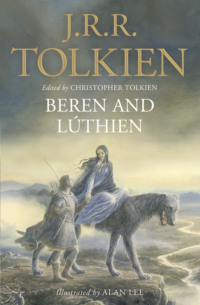
Beren and Lúthien
The prime mover in their rebellion against the Valar was Fëanor, maker of the Silmarils; he was the eldest son of Finwë, who had led the host of the Noldor from Cuiviénen, but was now dead. In my father’s words:
The Jewels were coveted by Morgoth the Enemy, who stole them and, after destroying the Trees, took them to Middle-earth, and guarded them in his great fortress of Thangorodrim. Against the will of the Valar Fëanor forsook the Blessed Realm and went in exile to Middle-earth, leading with him a great part of his people, for in his pride he purposed to recover the Jewels from Morgoth by force.
Thereafter followed the hopeless war of the Eldar and the Edain [the Men of the Three Houses of the Elf-friends] against Thangorodrim, in which they were at last utterly defeated.
Before their departure from Valinor there took place the dreadful event that marred the history of the Noldor in Middle-earth. Fëanor demanded of those Teleri, the third host of the Eldar on the Great Journey, who dwelt now on the coast of Aman, that they give up to the Noldor their fleet of ships, their great pride, for without ships the crossing to Middle-earth by such a host would not be possible. This the Teleri refused utterly.
Then Fëanor and his people attacked the Teleri in their city of Alqualondë, the Haven of the Swans, and took the fleet by force. In that battle, which was known as The Kinslaying, many of the Teleri were slain. This is referred to in The Tale of Tinúviel (p. 42): ‘the evil deeds of the Gnomes at the Haven of the Swans’, and see p. 130, lines 514–19.
Fëanor was slain in battle soon after the return of the Noldor to Middle-earth, and his seven sons held wide lands in the east of Beleriand, between Dorthonion (Taur-na-fuin) and the Blue Mountains.
The second son of Finwë was Fingolfin (the half-brother of Fëanor), who was held the overlord of all the Noldor; and he with his son Fingon ruled Hithlum, which lay to the north and west of the great chain of Ered Wethrin, the Mountains of Shadow. Fingolfin died in single combat with Morgoth. The second son of Fingolfin, the brother of Fingon, was Turgon, the founder and ruler of the hidden city of Gondolin.
The third son of Finwë, the brother of Fingolfin and half-brother of Fëanor, was in earlier texts Finrod, later Finarfin (see p. 104). The eldest son of Finrod/Finarfin was in earlier texts Felagund, but later Finrod; he, inspired by the magnificence and beauty of Menegroth in Doriath, founded the underground fortress-city of Nargothrond, for which he was named Felagund, ‘Lord of Caves’: thus earlier Felagund = later Finrod Felagund.
The doors of Nargothrond opened onto the gorge of the river Narog in West Beleriand; but Felagund’s realm extended far and wide, east to the river Sirion and west to the river Nenning that reached the sea at the haven of Eglarest. But Felagund was slain in the dungeons of Thû the Necromancer, later Sauron; and Orodreth, the second son of Finarfin, took the crown of Nargothrond, as told in this book (pp. 109, 120).
The other sons of Finarfin, Angrod and Egnor, vassals of their brother Finrod Felagund, dwelt on Dorthonion, looking northwards over the vast plain of Ard-galen. Galadriel, the sister of Finrod Felagund, dwelt long in Doriath with Melian the Queen. Melian (in early texts Gwendeling and other forms) was a Maia, a spirit of great power who took human form and dwelt in the forests of Beleriand with King Thingol: she was the mother of Lúthien and the foremother of Elrond.
In the sixtieth year after the return of the Noldor, ending many years of peace, a great host of Orcs came down from Angband, but was utterly defeated and destroyed by the Noldor. This was called Dagor Aglareb, the Glorious Battle; but the Elvish lords took warning from it, and set the Siege of Angband, which lasted for almost four hundred years.
The Siege of Angband ended with a terrible suddenness (though long prepared) on a night of midwinter. Morgoth released rivers of fire that ran down from Thangorodrim, and the great grassy plain of Ard-galen that lay to the north of Dorthonion was transformed into a parched and arid waste, known thereafter by a changed name, Anfauglith, the Gasping Dust.
This catastrophic assault was called Dagor Bragollach, the Battle of Sudden Flame (p. 106). Glaurung Father of Dragons emerged from Angband now for the first time in his full might; vast armies of Orcs poured southwards; the Elvish lords of Dorthonion were slain, and a great part of the warriors of Bëor’s people (pp. 105–6). King Fingolfin and his son Fingon were driven back with the warriors of Hithlum to the fortress of Eithel Sirion (Sirion’s Well), where the great river rose in the east face of the Mountains of Shadow. The torrents of fire were stopped by the Mountains of Shadow, and Hithlum and Dor-lómin remained unconquered.
It was in the year after the Bragollach that Fingolfin, in a fury of despair, rode to Angband and challenged Morgoth.
*
Конец ознакомительного фрагмента.
Текст предоставлен ООО «ЛитРес».
Прочитайте эту книгу целиком, купив полную легальную версию на ЛитРес.
Безопасно оплатить книгу можно банковской картой Visa, MasterCard, Maestro, со счета мобильного телефона, с платежного терминала, в салоне МТС или Связной, через PayPal, WebMoney, Яндекс.Деньги, QIWI Кошелек, бонусными картами или другим удобным Вам способом.
Вы ознакомились с фрагментом книги.
Для бесплатного чтения открыта только часть текста.
Приобретайте полный текст книги у нашего партнера:
Всего 10 форматов